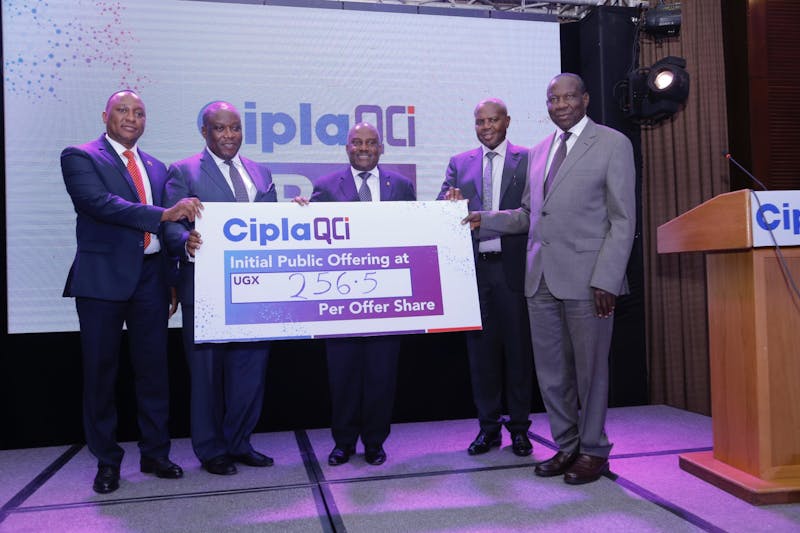Thoughts on Cipla IPO

Several clients have asked us for thoughts on Cipla’s Initial Public Offer (IPO) and whether it presents a good opportunity for their individual accounts and/or the XENO Uganda Domestic Equity Fund portfolio. We have decided to share our private thoughts with the over 1,100 people who have trusted XENO as their investment manager and opened their investment accounts with us.
Cipla Quality Chemical Industries Limited (“Cipla”) is a pharmaceutical company founded by three Ugandan gentlemen. They brought on Cipla, an established pharmaceutical company based in India as a technical partner and majority shareholder. The combined entity currently manufactures treatments for HIV/AIDS, malaria, and hepatitis B. Its major customers are the Government of Uganda (long-term contract), Government of Zambia (long-term contract), and the Global Fund (short-term).
Cipla is now offering 18% percent of its shares to the public through an IPO to allow some existing shareholders to realize their investment and exit. Cipla is not raising money in this IPO and none of the proceeds will accrue to it.
The pros
Finally, an IPO!
Cipla is the first IPO in Uganda in almost 5 years. There’s been a dearth of companies offering their shares to the public either as a way of raising capital or as an avenue for existing shareholders to realise their investments. It is not for lack of interest from investors, since institutional assets, especially pension funds, have grown at an annual clip north of 20%. There should significant appetite from both institutional and retail investors.
Pharma: a sectoral play
Cipla is the first pharmaceutical company to go public in the health sector on the East African stock markets. Institutional investors interested in a sectoral play will use it to gain exposure to the health sector which benefits from significant government and household healthcare expenditure. There should be healthy robust demand from institutional investors across the East African region for this reason.
Lone Ranger
Cipla has the unique advantage of being the only facility in Sub-Saharan Africa manufacturing several WHO-prequalified anti-retrovirals and anti-malarials. It might also benefit from local content advantages that could improve its margins from sales within the EAC. Cipla’s product portfolio provides treatments for the common diseases in Sub-Saharan Africa and this makes them an excellent play if the management has the strategic nous to convert all these advantages as well as fight off competition and/or build moats around its turf.
Then cons
Miserly free-float
Only 18% of the company is being offered to the public (free-float) and even then, 90% of that has been reserved and sold to institutional investors (read large pension funds) and so only 1.8% of Cipla is truly available to everyone else. Listed companies that have negligible free floats have tended not to trade at all once the IPO-induced euphoria is done. This in turn hinders the proper functioning of the price discovery process through buying-and-selling of company stock on the stock exchanges as intended. The few investors will therefore hold stocks whose true value is not established in the open market or is flat for prolonged periods due to illiquidity.
Aggressive valuation
At USh 256.5 per share, Cipla as a company has an implied valuation of USh 0.93 trillion. Okay, let’s call by its name: Cipla is a USh 1 trillion company. Now, when you consider the fact that when you’re investing; you’re buying a series of future cash flows and then you see this price tag, one might want to pause for breath. Should you buy the promise of future cash flows at that implied valuation?
Reliance on few customers
The company’s current fortunes are dependent on three sources: Governments of Uganda & Zambia (long term contracts) and the Global Fund (short term contract) sourced through tendering processes. A loss of any of those contracts will have a profound impact on Cipla’s revenue streams.
Unambitious growth
Looking through the prospectus it is not immediately clear how the Company is likely to achieve double-digit year-on-year growth to justify its valuation. There’s a vague statement about entering 19 African countries and then statements tying the company’s fortunes to the implementation of the East African Community Regional Pharmaceutical Plan of Action. No compelling case was made as to how this would lead to a healthy bottom line.
The punt
We have highlighted only some of the issues you would need to consider in making your decision. Should you buy Cipla? ABSOLUTELY. Question is how much? Answer: it depends on your risk tolerance. Remember, share prices can go up as well as down. We have indicated the factors that can cause the share price to rise or fall. When investing in the stock markets, capital is not guaranteed.
At XENO we take a portfolio perspective in our goal-based approach to investing. The first question we ask our investors before giving them advice is: why are you investing? Is it for your retirement, child’s education, building wealth, etc. We start by helping you articulate your investment goal, identify the constraints within which you want to achieve that goal, and then suggest a diversified investment portfolio to achieve your goals from a broad investment universe.
The diversified portfolio is executed using our four pure asset class unit trust funds: XENO Uganda Money Market, XENO Uganda Bond Fund, XENO Uganda Domestic Equity Fund, XENO Uganda Regional Equity Fund. Using the XENO Platform, we help every individual or institutional investor to find the best combination assets from the investment universe to consistent with their investment goal and risk tolerance. Judiciously combining the asset classes in the above investment universe can help you achieve your goals comfortable. We do not believe in putting all our eggs in one basket, neither should you.
Finally, we will buy some of Cipla shares for the XENO Uganda Domestic Equity Fund, but only in proportions consistent with our investment strategy.
Happy investing!
